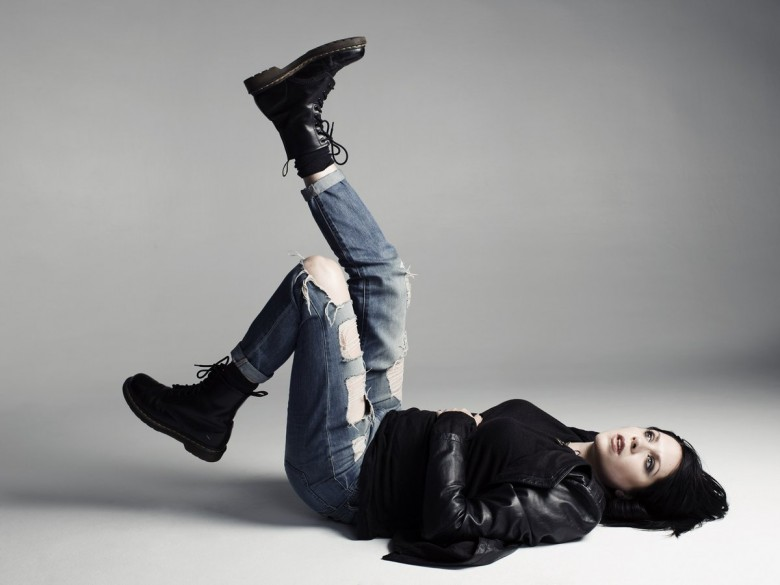"Wow, who was that?"
Those were the words that came out of my mouth when I first heard K. Flay's song "Blood in the Cut." I was driving home late one night tuned to Buffalo's own 103.3 The Edge, and this smoldering, abrasive, grimy track got under my skin from the very first chorus. It was the kind of edgy yet catchy track that you hear in movie trailers that makes you want to just smash something - in the best way possible! Thankfully it was not long before I got the skinny on the track and on the history of Miss Kristine Flaherty, or K. Flay as she is known.
Turns out, she's been around for a good while, but only now was I hearing her unique blend of sharp and cutting indie alternative and hip hop. As each day passed I heard the song more and more and could sense her rising up the ladder, becoming more prominent on the airwaves, so I decided then and there I had to talk to her. Lucky for me, her tour was slated for a stop in Buffalo on March 2. I had a chance to sit with Miss Flay on the evening of her show at The Waiting Room. Sporting a wonderful "Immigrants Welcome" hoodie while we chatted, I picked her brain about where she sees herself on the musical landscape, and how she defines herself.
Q. What factors do you think came together that really made a big push for your music now, even though you’ve been around for years?
A. I think in terms of radio stuff, a huge part of it is that I'm on a major label so I have more access to radio and other parts of the infrastructure. It's partially that, but I hope it's a combination of the music being interesting and good in certain ways and having that team of people to get it out into the world.
Q. At what point did it stop being difficult or painful to write words about stories from your life? Has it always been that way, or was it never that way?
A. I don't think it's ever been difficult. I think it's always been cathartic. Writing about that stuff, it's not like a therapy session and I'm digging into memories I don't want to access. For me, I enjoy investigating that stuff and thinking about it. So in the context of music, I think it feels like a breakthrough and it makes me happy. The tough part is how it could affect other people in my life.
Q. Because your music pulls from so many spectrums, would you say you’re a person who isn’t content to root herself to any particular label or style?
A. I think that's totally accurate. I didn't start making music in any sort of scene and I wasn't surrounded by other people making music. A lot of my early experimental years, I was kind of in a vacuum, and I'd take things I liked from other songs. Since I've been touring I've had a very transient life, and I like that freedom and mobility. There are so many things I'm interested in and places I want to be.
Q. Being a younger person, do you feel your music cuts to the heart of social problems and anxieties that have arisen in the younger generation more than in past generations? Do you feel you can be a voice?
A. I certainly think that it's great that we exist in a time where people are very open, and I hope that some of my music speaks to that. I've always been inundated in all that, but that being said, there are people of all ages at the shows. But I think it feels especially true if you are in your 20s, 30s, or even 40s.
Q. In the content of your music and with your appearance on television, do you feel that your songs, like your new single "Black Wave" which is about rising up, can and will determine mindsets and make even small impacts in society?
A. I hope so. I think wherever you are on the political spectrum; we are living in a very strange moment in our history. There are a lot of way to express that, whether it's through dissatisfaction or a spiteful rage. But it all contributes to this feeling. Certain songs and art pieces become center points, but resistance is a wave, and all parts and particles have to come together. Things are going to emerge as very salient. And I hope to be a voice of that.
Q. A music critic I admire, Anthony Fantano, said hip hop is entering its punk phase now, sonically. You’ve worked with Danny Brown before, and with his latest record and people like Chance the Rapper and Lil Yachty and others. Do you feel that’s true and do you feel a part of it? Why do you think that is?
A. I feel that punk is more an attitude than a sound. I agree that we're in a great moment for hip hop, especially stuff breaking into the mainstream. There definitely isn't one particular sound for hip hop right now, but as to whether I consider myself part of it, I would say sure. I mean that was my entrance into music, and that in-your-face, first person storytelling comes from all of that, and it's something I obviously do a lot. I think people are much more accepting of genre blending now, which is great because that's what I do.
Like, follow, enjoy!
https://www.facebook.com/kflaymusic/
http://www.kflay.com/

